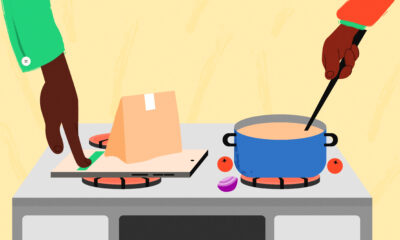Features
BN Doctors’ Lounge with Dr. Folasade Alli: Let’s Talk About Pneumonia
 Pneumonia is an infection that inflames air sacs in one or both lungs, which may be filled with fluid. It can be a serious and life-threatening disease.
Pneumonia is an infection that inflames air sacs in one or both lungs, which may be filled with fluid. It can be a serious and life-threatening disease.
It is caused by inhalation of germs called bacteria or viruses, and starts after having a cold or the flu (influenza). These illnesses make it hard for your lungs to fight infection, therefore, making you prone to pneumonia. Also, having a long term chronic disease like cancer or diabetes makes you more likely to get the infection.
It is the leading cause of death due to infection in children younger than 5 years of age, across the world.
Those at high risk for pneumonia include;
- Persons of older age
- Children between 0 and 5
- People who consume large amounts of alcohol
- Smokers
- Those without a spleen – support respiratory system
- People with underlying health problems like diabetes, chronic heart, lung or kidney disease.
Though the symptoms of pneumonia are numerous, the following are the most common ones:
- Cough (rusty or green phlegm or sputum, coughed up from the lungs)
- Fever
- Fast breathing and feeling short of breath
- Shaking and “teeth-chattering” chills
- Chest pain that often feels worse when you cough or breathe in
- Fast heart beat
- Feeling very tired or very weak
- Nausea and vomiting
- Diarrhea
- Sweating
- Headache
- Muscle pain
- Confusion or delirium, especially in older adults
- Dusky or purplish skin colour or cyanosis from poorly oxygenated blood.
The good news is, pneumonia is curable. Pneumonia can be cured by antibiotics prescribed by your doctor. There are also things you can do to feel better during your treatment.
Bacterial types of pneumonia are usually treated with antibiotics.
Viral types of pneumonia are usually treated by getting plenty of rest and sleep. Drink lots of liquids; do not smoke, and if your cough keeps you awake at night, talk to your doctor about using cough medicine.
Fungal types of pneumonia are usually treated with antifungal medications.
Pneumonia can be prevented by taking extra care in cleaning up and adopting a healthier lifestyle.
Prevention tips include:
- Washing your hand very often, in order to stop spread of the bacteria and viruses.
- Immunisation; the pneumococcal vaccination & influenza vaccine to prevent the flu.
- Refraining from smoking.
- Exercising 5 days a week
- Eating healthily.
- Covering the mouth and nose when coughing or sneezing.
Photo Credit: © Noriko Cooper | Dreamstime.com
























